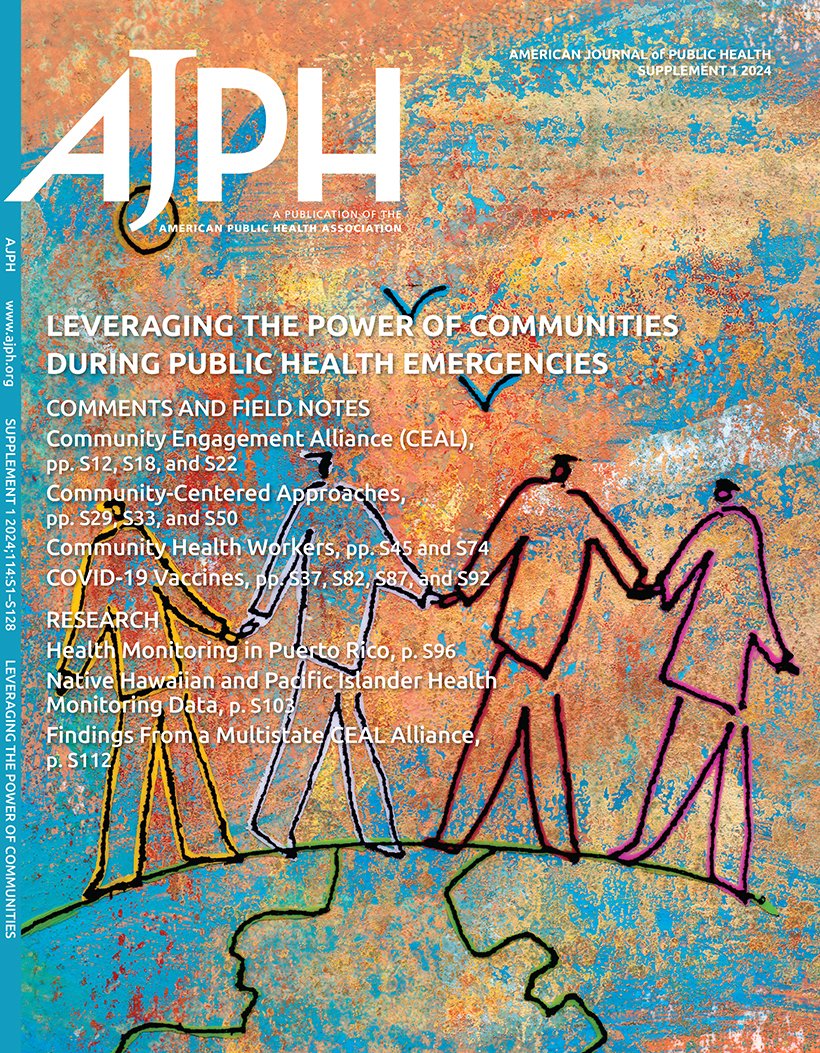Academic Hegemony and Monitoring of Shared Power in Community-Engaged Research Trials: The Mid-Atlantic Center for Cardiometabolic Health Equity, 2023-2024.
IF 9.6
1区 医学
Q1 PUBLIC, ENVIRONMENTAL & OCCUPATIONAL HEALTH
引用次数: 0
Abstract
Objectives. To measure community-engaged research processes used by researchers across 3 trials based on data from a community engagement monitoring and evaluation tool. Methods. The Mid-Atlantic Center for Cardiometabolic Health Equity Community Engagement Core used a tracking form developed by the Johns Hopkins Center for Health Equity to monitor its community-engaged research processes (the frequency and types of engagement activities, the categories of community partners engaged, and the rate at which each study team enacted community partners' recommendations) between February 2023 and June 2024. Results. The 3 trials reported 114 engagement activities, predominated by meetings convened with specific community partners (60.5%). The community partners most frequently engaged included community organizations and local businesses (28.6%), frontline health care workers (27.5%), and health care organizations (19.6%). Recruiting and retaining study participants (28.8%) was the most discussed topic, followed by addressing implementation challenges (20.5%) and recruiting and retaining study sites (20.1%). Study teams implemented community partners' recommendations at an overall rate of 93.1%. Conclusions. Study findings underscore the importance of developing monitoring and evaluation tools that discern whether shared power is achieved in community-engaged research trials and identify opportunities to dismantle academic hegemony. (Am J Public Health. 2025;115(S2):S164-S173. https://doi.org/10.2105/AJPH.2025.308188).学术霸权和社区参与研究试验中共享权力的监测:大西洋中部心脏代谢健康公平中心,2023-2024。
目标。基于社区参与监测和评估工具的数据,测量研究人员在3个试验中使用的社区参与研究过程。方法。大西洋中部心脏代谢健康公平中心社区参与核心使用约翰霍普金斯健康公平中心开发的跟踪表格来监测其社区参与的研究过程(参与活动的频率和类型,参与的社区合作伙伴的类别,以及每个研究小组制定社区合作伙伴建议的比率)在2023年2月至2024年6月之间。结果。这3项试验报告了114项参与活动,主要是与特定社区合作伙伴召开的会议(60.5%)。最常参与的社区合作伙伴包括社区组织和当地企业(28.6%)、一线卫生保健工作者(27.5%)和卫生保健组织(19.6%)。招募和留住研究参与者(28.8%)是讨论最多的话题,其次是解决实施挑战(20.5%)和招募和留住研究地点(20.1%)。研究小组执行社区伙伴建议的总体比率为93.1%。结论。研究结果强调了开发监测和评估工具的重要性,这些工具可以辨别在社区参与的研究试验中是否实现了共享权力,并确定了拆除学术霸权的机会。[J] .公共卫生杂志。2025;115(增刊2):S164-S173。https://doi.org/10.2105/AJPH.2025.308188)。
本文章由计算机程序翻译,如有差异,请以英文原文为准。
求助全文
约1分钟内获得全文
求助全文
来源期刊

American journal of public health
医学-公共卫生、环境卫生与职业卫生
CiteScore
9.50
自引率
3.90%
发文量
1109
审稿时长
2-4 weeks
期刊介绍:
The American Journal of Public Health (AJPH) is dedicated to publishing original work in research, research methods, and program evaluation within the field of public health. The journal's mission is to advance public health research, policy, practice, and education.
 求助内容:
求助内容: 应助结果提醒方式:
应助结果提醒方式:


